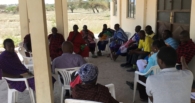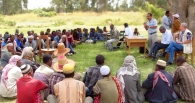Annual World Bank Conference on Land and Poverty
Washington DC March 23—27 2015
Christopher Tanner
12 May 2015
/
- 0 Comments
The annual World Bank Land and Poverty Conference is one of the major events in the agenda of all those who work on land and related development issues. It brings together technical specialists, academics, government officers and development experts from all corners of the globe. As well as showcasing new work covering a huge range of topics, it provides an unparalleled opportunity for networking and making new contacts.
The conference has now been running for 15 years. This year it was attended by over 1000 participants from 123 countries. I attended both to present a paper (see link below), and to represent Mokoro and promote our expertise and experience as a consulting company in the land and natural resources areas.
The paper was written with inputs from two FAO colleagues with whom I had worked during my years in Mozambique, running a programme of community-level legal empowerment to encourage local people to more effectively use and defend their rights under the progressive 1997 Land Law. The paper was one of four in the session on Legal Empowerment: Approaches and Impacts . Together they presented a clear endorsement of the rights-based and legal empowerment methodology now being used in many parts of the world to arm citizens with the basic knowledge and legal support to engage far more proactively with governments and private sector interests who want to use their land. The message even resonated with legal experts from the United States who saw the relevance for community rights and anti-corruption struggles there. Mokoro’s participation also helped to demonstrate our capacity in the access to justice and legal empowerment sphere.
The conference has perhaps become top heavy, with 126 different sessions organised over the three main conference days with a total of just under 550 papers presented. While we were talking, eight other sessions were under way in other meeting rooms. In addition there were poster sessions and lunchtime meetings, and for the first time this year, an Innovations Fair demonstrating how new technology and open data can contribute to scaled-up improvements in land governance and accountability.
The Conference was opened by the Harvard professor and author of ‘Why Nations Fail’, James Robinson. Reflecting the theme of the conference – Linking Land Tenure and Use for Shared Prosperity – he underlined how too narrow a focus on the technical aspects of land administration and management can result in land governance systems which fail to deliver tangible benefits to the many millions of people who depend upon land as the basis of their livelihoods. Fully taking into account and responding to the underlying political economy of land governance is essential if the link between tenure and use is indeed to produce ‘shared prosperity’.
It was impossible to attend even a small proportion of the many sessions, but a look at the agenda shows how the underlying concern to make land governance generate real and positive impacts for ordinary people is gaining traction in the mainstream debates around land issues. One notable issue which cropped up in many sessions and was thus addressed from a variety of viewpoints was that of large-scale land acquisitions and their relationship to and impact on local people whose land is ‘acquired’ for large private and state-backed projects. It struck me how far the discourse has moved on about how local land rights are dealt with, with an emerging consensus about treating local communities and households as stakeholders with rights not only over the land being earmarked for new investment projects, but also with rights to participate in the development and implementation of new projects. The goal is to have an investment process that benefits rather than undermines local livelihoods, and enhances the quality of life of the citizens amongst whom the investment takes place. A striking feature in this context was to see this repeated both in countries like Uganda and Sierra Leone, and in countries like the United States and the United Kingdom (a session on Private Sector Participation in Regenerating Urban Land was an eye-opener). The underlying message of respecting local rights and working with local people is a common thread which, when genuinely taken into account, can result in remarkable things, whatever the level of sophistication and size of budget.
Protagonists present rosy pictures, however, and evidently the reality is not so picture-perfect in most cases. It is useful to reflect on criticisms of the event which see it as ‘a cruel farce’ and cite observers like Anuradha Mittal of the Oakland Institute who point out that ‘around the world, local communities face forced evictions and human rights abuses linked to Bank-financed projects’ (Mittal, 2015). One of the dangers of ‘good governance’ which promotes active partnerships between investors and communities and negotiated access to land by investors is precisely that it can in fact give a cosmetic glow to so-called land-grabbing and do little to address the radical changes in the community-investor relationship that are needed to generate the sustainable prosperity we all seek.
To counter such criticism, it is fair to say that the conference did include cases where large-scale investments and ‘public-private’ partnerships (investors backed by States) were effectively ignoring local rights and dispossessing local people in the name of ‘national development’. The lie behind assumptions about how these projects are good for people whose lives are affected, because they generate jobs and other ‘trickle down’ benefits, was clear in papers I heard in the session on Identifying and Dealing with Under-performing Land Investment Projects. Even where international agencies were present in the investment chain, promoting the principles and messages of new instruments like the FAO Voluntary Guidelines on the Responsible Governance of Tenure of Land, Fisheries and Forests in the Context of National Food Security (VGGT), there was clear evidence of local rights being set aside and ‘consultation’ and ‘participation’ being little more than telling people what was going to happen to them.
It is also abundantly clear from what was on offer in the conference agenda that while many countries now have new laws that recognise local rights and promote the idea of a more inclusive model of investment-led development, deeply rooted power relations and unreformed socio-political systems allow these laws to be over-ridden, with excuses like it ‘being in the national interest’ or that it will make better use of resources than local people are able to.
There were some striking examples of success, however. A paper presented by the investment company Addax, about its large-scale cane sugar project in Sierra Leone, demonstrated very clearly what can be achieved when a private firm does set out to work with local land rights holders and ensure that the investment brings positive benefits to both sides. An account of a new palm oil project in Uganda funded by IFAD described a process of project appraisal, design and implementation which has closely involved local people and is clearly transforming their lives in a positive way. While such stories are still relatively rare, the fact that this issue is clearly out in the open and a central theme at an event like the Land and Poverty Conference does indicate some degree of progress within the corridors of major institutions like the World Bank.
The private sector was at the Conference largely in the shape of firms developing and marketing their state-of-the-art technical wizardry to deal with land governance challenges. The notion that these technical advances can sort out the world’s land problems does seem wildly at odds with James Robinson’s opening remarks on the need to deal with underlying political economy issues. These are where the heart of most land problems lies, and the one session I attended on a range of new high-tech solutions left me feeling convinced that the technical side of the land fraternity has little real idea of the reality on the ground. Faith in technical solutions as an alternative to the hard work of working with and respecting local people is a path that has caused millions of dollars to be wasted in so many ‘land projects’, resulting merely in institutional wish lists and fostering corruption.
Given the importance of the large-scale private investment issue in the current land and natural resources debate, it is surprising that the ‘other private sector’ – the one that really matters in the land and poverty context – was not more evident at the event. These are the much talked-of and often vilified agents of change, who are such a powerful force in land-based development in so many countries. Why were more investors like Addax not there?
I would not call the Land and Poverty Conference a farce. Far from it, there were many serious people there with a deep commitment to real change that can improve the lives of millions of ordinary people around the world. I would say however that although this conference is a rare opportunity to bring all sides together to listen, talk and increase understanding, it fails to realise its full potential in this regard. I found it stimulating and it offered me a chance to dip into areas that I would not normally look at. I certainly gained hugely from the networking, and enjoyed meeting old friends. But those who organise future conferences will have to figure out how to bring the protagonists on each side of the global and local ‘land question’ together, and to make more use of the potential to promote real debate and understanding.
In this way the conference could move up a gear and become more than just a networking opportunity for those of us in the international development industry who work on land. With a different focus and wider participation from those who actually work on and use land – smallholder and local farmer groups, farmers associations, private sector firms and the financial sector – it could become a vehicle for the kind of change that really will address underlying political economy issues and produce ‘shared prosperity’.
Access the conference agenda with references to all papers here.
You must be logged in to post a comment.




